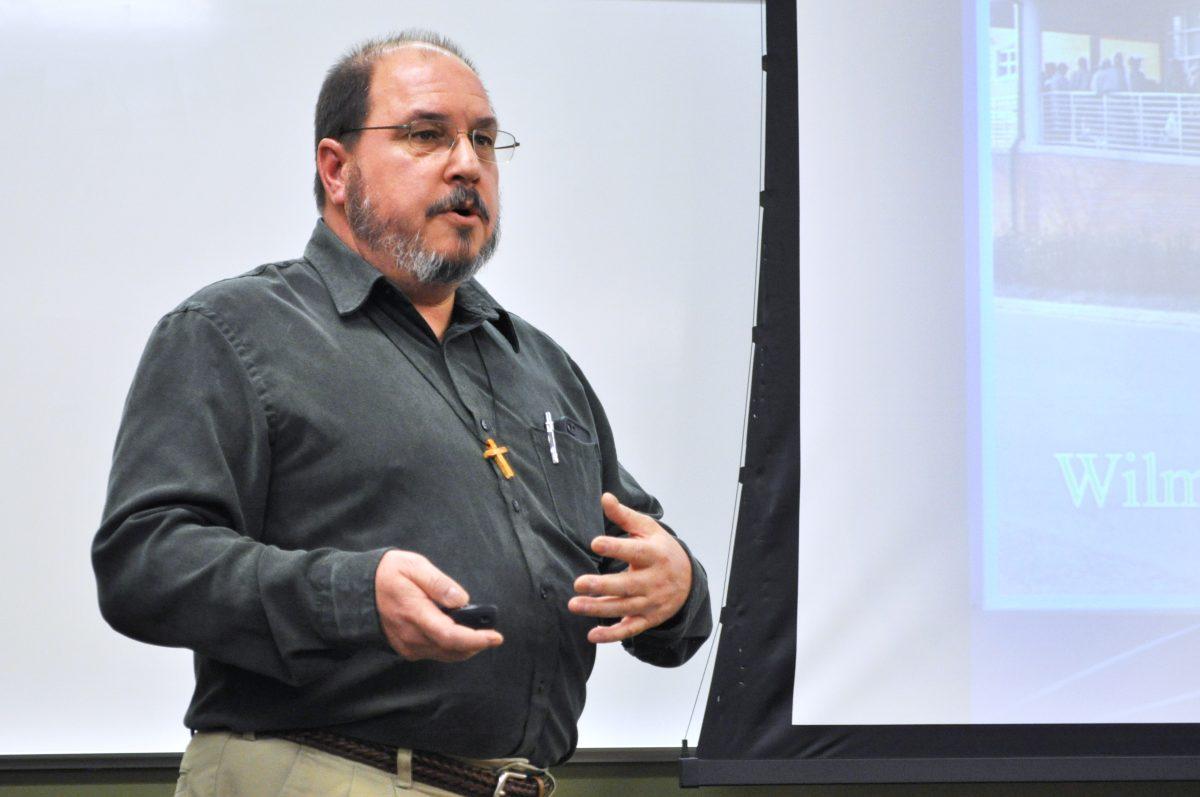
Elizabeth Davis
Doug Kemp of Church in the Woods talked to N.C. State students Thursday, February 27 in Daniels Hall about the lives of those who are homeless in the Raleigh area. The organization aims to improve the lives of the homeless and provide a support service for them. Photo by Elizabeth Davis
Advocates Doug Kemp and Issel Masses gave a presentation about the importance of aiding the homeless to members of the Amnesty International club in Daniels Hall Thursday.
Kemp, the pastor of Church in the Woods, an outreach ministry of volunteer prayer teams that help homeless communities in the Raleigh area, spoke about his concerns for those affected by homelessness as well as the reasons why they need and deserve help.
Kemp said it is important to not overlook the issue of homelessness because of the broad range of people it affects, including veterans, single women, immigrants, refugees and even families with newborns.
According to Kemp, because they are poor and homeless, people on the streets are targeted as something to be afraid of.
“They are the lepers of today’s society,” Kemp said.
Kemp discussed the many situations homeless people face and displayed images of the make-shift homes made mostly out of billboards, tarps or cardboard that homeless people often live in.
“Some people are living out of their cars,” Kemp said.
Masses, a graduate student at Duke University, referenced the poor living conditions in the slums of Bangalore, the third most populated city in India and said homelessness is an issue seen around the world.
Kemp said, because it is more difficult for the justice system to reach into the lives of these people, it is important for everyday individuals to reach out and help the homeless communities.
For example, Kemp said if a couple cannot afford to have a child, the mother or father could end up murdering the baby in order to escape the responsibilities of keeping it. An act like this would more than likely go unnoticed by the United States justice system.
Kemp said there are a few problems preventing getting aid to the homeless. For example, feeding the homeless is illegal in Raleigh according to Section 9-2022 of city ordinances regarding parks.
Kemp and Masses said another issue preventing the aid to homelessness is the new requirement of eviction notices for the homeless that ensures that people do not reside on private property.
Kemp said this issue does further complicate the lives of homeless people in the community, because it gives them nowhere to go.
Masses said about 5,000 people were evicted from their homes in Bangalore due to the development of malls and hotels.
“Where you go at the end of the day is your home,” Kemp said.
Kemp and Masses also discussed the ways people in the community can reach out and help.
Kemp said it is essential to get involved with government groups, such as participating in town hall meetings and non-profits but also spending time with them.
“There’s no us and them,” Kemp said. “The biggest thing is love. Your time spent with them is the biggest help they can get.”
According to Kemp, roughly 50 percent of homeless people have mental illnesses, such as bipolar disorder and schizophrenia, yet, because they lack health care, these diseases go untreated.
Kemp said many homeless people have serious alcohol addictions that prevent them from trying to do better for themselves.
“These people go to bed with a beer in their hand and wake up with a beer in their hand,” Kemp said.
Masses stressed the importance of doing independent research by collecting data and becoming familiar with the issue of homelessness.
Michelle Gardner, a senior in political science with a concentration in public policy and the president of the Amnesty International club, said she thought it was interesting to get a global and area perspective on the issue of homelessness.
Gardner said she learned more about what she can do to raise awareness on the issue.
Alex Wang, a senior in computer science, said he thought it was interesting to see images of the shelters that the people built themselves.
“They are in our backyards and we don’t see them,” Wang said. “We have to dig a little deeper to actually find them.”